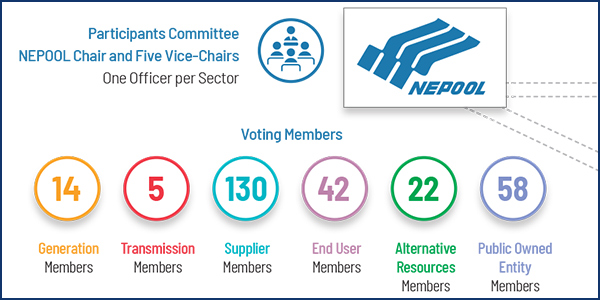By Rich Heidorn Jr.
The New England Power Pool indicated Thursday it won’t let reporters into its meetings without a fight, asking FERC to reconsider its order rejecting the group’s press ban.
The commission ruled unanimously Jan. 29 that it had jurisdiction over NEPOOL’s membership rules and that barring journalists from joining was unduly discriminatory (ER18-2208-001). (See FERC Rejects NEPOOL Press Membership Ban.)
FERC said it would rule separately on RTO Insider’s complaint under Section 206 of the Federal Power Act asking the commission to terminate the group’s stakeholder role or direct ISO-NE to adopt an open stakeholder process like those used by other RTOs (EL18-196). New England is the only one of the seven U.S. regions served by RTOs or ISOs where the press and public are prohibited from attending stakeholder meetings.
The stakeholder group sought to amend the NEPOOL Agreement to bar members of the press from membership after RTO Insider reporter Michael Kuser, an electric ratepayer in Vermont, applied to join as an End User in March 2018.
In its request for rehearing or clarification, NEPOOL contended that “the commission’s jurisdictional determination not only lacks sufficient explanation, but its conclusion that the membership provisions are jurisdictional is potentially limitless in scope.
“Under these circumstances and given the issues pending before the commission in the complaint proceeding in Docket No. EL18-196, NEPOOL files this request to preserve its rights until the commission provides clarity and explanation for its decision to exercise jurisdiction over the membership arrangements of an entity that does not provide wholesale power or transmission service to any customer,” the organization continued.
The commission’s order rejected NEPOOL’s contention that its membership provisions were not FERC-jurisdictional, concluding that “they directly affect commission-jurisdictional rates.”
NEPOOL said FERC’s ruling cited as precedent only “one factually dissimilar case … and provides no explanation as to how the cited precedent supports the commission’s jurisdictional claims.”
The case cited was a 2016 ruling involving PJM in which the commission found that the RTO stakeholder process is “a practice that affects the setting of rates, terms and conditions of jurisdictional services.” The commission made the filing in rejecting rehearing of an order approving PJM’s funding of the Consumer Advocates of the PJM States. (See FERC Upholds PJM Advocates’ Funding.)
“Without an explanation of how and why PJM is relevant to the treatment of NEPOOL’s membership amendments, the January order fails to meet the commission’s obligation to carry out reasoned decision-making,” NEPOOL said. “NEPOOL requests that the commission further articulate the basis for its conclusion that the membership amendments are jurisdictional. As it stands, the January order could be read to sweep virtually any NEPOOL practice, procedure or protocol under commission jurisdiction, no matter how tangential to rates, terms or conditions of jurisdictional service.”
NEPOOL said the commission’s reasoning was “similar to the expansive view of its jurisdiction that was rejected” by the D.C. Circuit Court of Appeals in its 2004 CAISO ruling.
In that case, the court rejected FERC’s attempt to replace CAISO’s Board of Governors, ruling that the commission “does not have the authority to reform and regulate the governing body of a public utility under the theory that corporate governance constitutes a ‘practice’ for ratemaking authority purposes.”
Membership Pending
NEPOOL’s rehearing request comes two weeks after its Membership Committee recommended to the Participants Committee that Kuser be granted membership. The Participants Committee has listed the issue on the agenda for its next meeting, March 13.
In addition to seeking to change its Agreement to bar press from membership, NEPOOL last year also amended the Participants Committee bylaws to limit the ability of meeting participants to share what they’ve heard.
The new language — which was not submitted for FERC approval — states that: “Attendees may use the information received in discussion, and may share the information received within their respective organizations or with those they represent, provided those who receive such communications are not press and also are aware of and agree to respect the nonpublic nature of the information. In no event may attendees reveal publicly the identity or the affiliation (other than sector affiliation) of those participating in meeting discussions.”
The commission’s January order left that prohibition intact.





